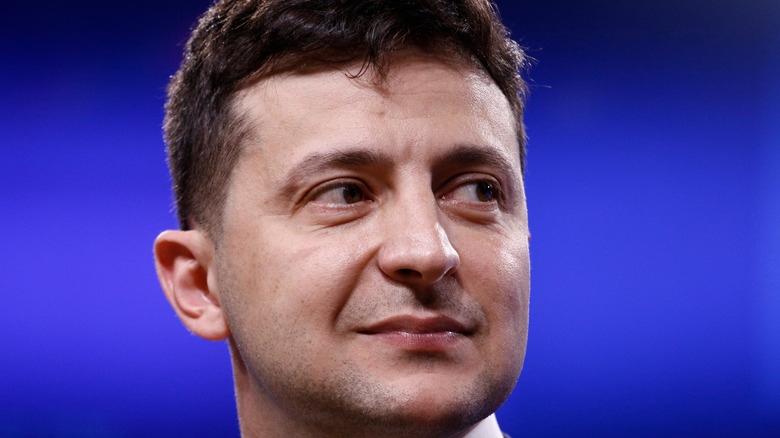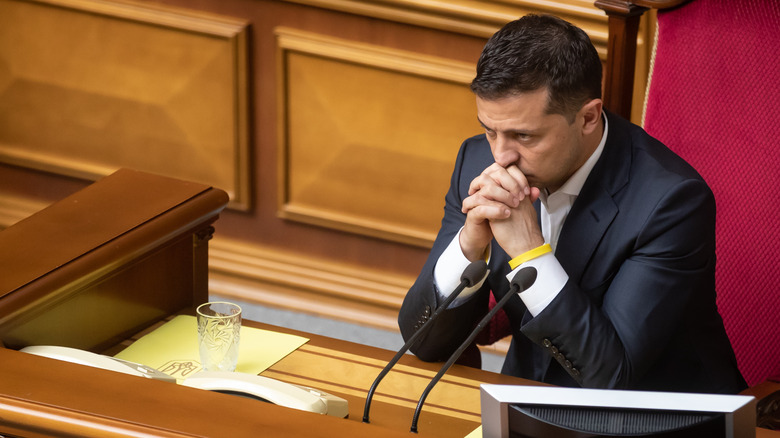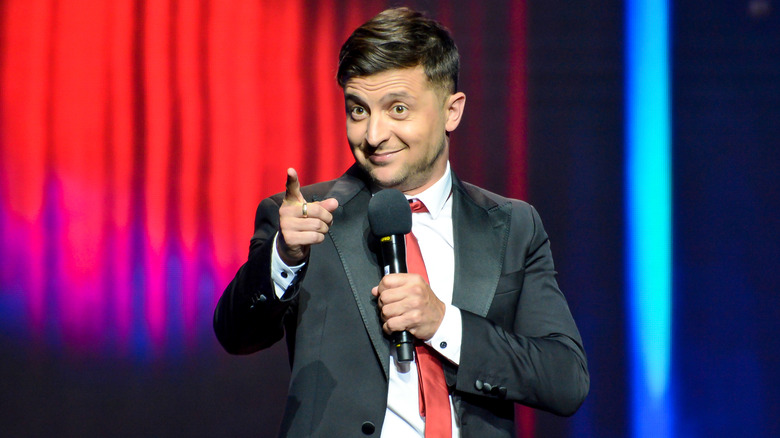How Volodymyr Zelenskyy Made History As President Of Ukraine
When invader-in-chief Vladimir Putin spoke of the "de-Nazification" of Ukraine (per NPR) at the onset of Russia's war against its former Soviet state, most people were left scratching their heads. It was a baldly absurd statement, one without even the barest pretext of truth. While Ukraine, like many other countries in recent history, has had to contend with far-right neo-Nazis in their midst (and their National Guard, via Vice), the nation is ardently democratic. As the country's Ministry of Foreign Affairs states, Ukraine has clung to "a love of freedom, democracy, free thinking and European values" since the mere 30 years since the USSR dissolved and Ukrainians have been able to live as they wish.
Even more to the point, and as might be common knowledge by now, Ukraine's president, Volodymyr Zelenskyy, is Jewish. In a statement that perfectly reflects the complexities of Russia and Ukraine's relationship, Zelenskyy is quoted by USA Today as saying, "I have Jewish blood. I am a Russian speaker, and I'm a citizen of Ukraine." With difficulty, as the Kyiv Post cites, Zelenskyy has opened up about his family's history and personal persecution at the hands of actual Nazis in World War II. And we don't mean distant relatives, either. He stated, "On my father's side, my grandfather and his three brothers were all on the front [in the Red Army] in World War II and only he returned." This is why, when Zelenskyy was elected the first Jewish Ukrainian president in 2019, he made history.
A lineage of Nazi-fighting veterans
Even without taking the current Ukraine-Russia war into account, and even despite Vladimir Putin's ludicrous "de-Nazification" statement, Volodymyr Zelenskyy's rise to presidency as a Jewish man in a former Soviet state is impressive in and of itself. As the Boston University International Law Journal describes, the USSR's initial 1917 Bolshevik "revoking of all and every national and national-religious privilege and restriction" turned to dust in the hands of mad dictator Joseph Stalin in the 1920s and '30s. Yet, through the 1950s, '60s, and 70's, the Jewish population in the USSR grew, and then more or less stabilized despite persistent Anti-Semitism and blatant discrimination across all sectors of society.
By all accounts, Zelenskyy was reluctant to discuss his heritage in the past, and only did so in 2016 in a TV interview (via USA Today), three years before he was elected president. It bears noting that he neither wielded an "underdog Jew" status on the campaign trail for his political benefit, nor treated his family's personal and tragic history in any way other than respectfully.
The Kyiv Post describes some details related by Zelenskyy over time. He grandmother, for instance, was one of those who survived World War II. She was born in Zelenskyy's hometown of Kryvyi Rih, and was evacuated to Kazakhstan before returning to Ukraine after the war. Other members of his family, including his grandfather, were "shot dead by Nazi occupants" while fighting for their lives against an "inhumane Nazi ideology."
A string of unique firsts
Volodymyr Zelenskyy has also made history not in just in big, dramatic, Nazi-combating ways, but by being a unique president in general. Zelenskyy studied law at Kryvyy Rih Economic Institute (a branch of Kyiv National Economic University) and is a fully licensed lawyer, per Above the Law. He founded the production company Kvartal 95, where he, among other things, became a regular performer on the televised improv comedy competition KVN, via Insider. From there, in a stunning, nearly unbelievable twist of fate, he starred in the political satire series "Servant of the People," where for three seasons he played (wait for it) a regular guy who becomes not only president, but a "heroic and adored leader," as Deadline describes. And of course, when Zelenskyy ran for president in 2019, he had no political experience and won with 73% of the vote, via the BBC.
Despite such an admirable, ironic, and sometimes baffling string of successes and firsts, Zelenskyy made it clear, from the get-go of his presidency, that he was not to be lauded, admired, or worshiped. In his inauguration speech, viewable on Twitter (with English subtitles), he quite seriously stated, "I would very much like for you to not have my portraits in your offices ... Because the president is not an icon, nor an idol. A president is not a portrait. Put there photographs of your children instead. And before making any decision, look them in the eyes."


